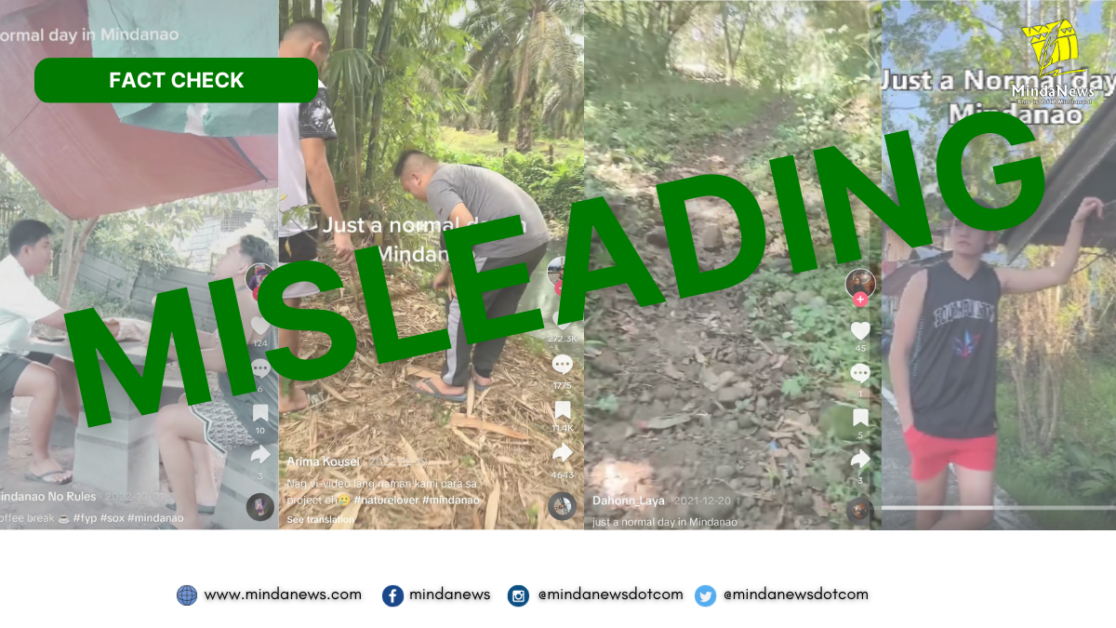
Several videos posted on social media labelled “Just a normal day in Mindanao, where bursts of gunfire can be heard, are misleading.
TikTok user @brynllyd posted a video of two men planting a tree when loud gunshots erupted in the background, prompting them to scamper but laughing out loud. One of them was heard saying “bakbakanay (clashes) guys.”
The video was captioned: “Nag vi-video lang naman kami para sa project eh” (We were just taking a video for a project).
TikTok user @dahonn_laya also posted a video in the wilderness with bursts of gunshots. It was also captioned “Just a normal day in Mindanao.”
Another TikTok post by @Mindanaonorules showed a video of two people drinking coffee under a blue tarpaulin also with a gunfire audio and with texts that say “Normal day in Mindanao.”
Over at Facebook, @Wamp1ptiJr. also posted a video with the description “Normal day in Mindanao.” Sounds of gunfire can also be heard in the video.
MindaNews tracked these videos to have been posted between December 12, 2021 and January 30, 2023, with netizens still commenting as recently as last September.
The videos generalized the entire Mindanao as an area where gunshots are a daily occurrence, which is false as peace has prevailed in most parts of the island. Before former President Rodrigo Duterte stepped down from power last year, he stressed that relative peace has been attained in Mindanao.
The TikTok video posted by @brynllyd generated at least 2.8 millions views, 272.2 thousand likes, 1,731 comments, and 11.4 thousand saves.
Many comments under @brynllyd’s post sounded like jokes. However, one of the top-liked comments mentioned that, “May part lang sa Mindanao na may ganyan pero sana di i-generalized dahil lang may parte. ” (There are some parts of Mindanao where that happens, but it should not be generalized just because of that.)
Mindanao is composed of the six administrative regions of Northern Mindanao, Davao Region, Western Mindanao, Caraga, Region 12 and the Bangsamoro Autonomous Region in Muslim Mindanao.
The country’s second largest island, Mindanao is home to 28 provinces, 33 cities and 422 municipalities.
Mindanao has been considered generally peaceful following the signing of the peace agreement between the Philippine government and the Moro Islamic Liberation Front (MILF) in 2014 after 17 years of negotiations. The MILF waged a bloody war with the government for their Right to Self-Determination.
A study released in June by the Mindanao Development Authority (MinDA) showed that the island has seen a “general atmosphere of peace and order, from a place of concern.”
MinDA conducted the survey in the first quarter of 2023 in the six regions of Mindanao, involving 7,000 respondents.
The study’s categories include Trust, Respect, Safety, and Satisfaction with tallies at 91% trust, 90% respect, 88% safety, and 90% satisfaction.
MinDa said that Northern Mindanao, BARMM, and Western Mindanao or the Zamboanga Peninsula recorded the highest safety ratings among the six regions at 89%. The Davao Region, Northern Mindanao and Soccsksargen or Region 12 got 88%.
According to MinDA, the positive rating in safety is due to the “various peace agreements and implementation of plenty of public safety activities.”
As with all our other reports, MindaNews welcomes leads or suggestions from the public to potential fact-check stories.
MindaNews is a verified signatory to the Code of Principles of the International Fact-Checking Network. (Miah Christine Bontilao / MindaNews)








